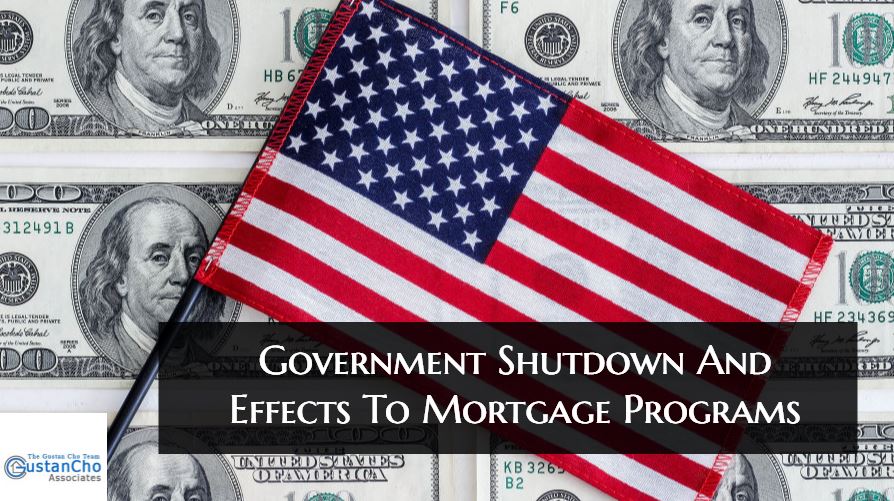Have you ever wonder what is government shutdown and effects to mortgage programs? A government shutdown occurs when non-essential federal government offices close because of lack of approval on the federal budget for the upcoming fiscal year. This event can significantly impact various sectors of the economy. These includes the housing market and mortgage programs. This article explores how government shutdowns affect mortgage programs, the broader housing market, and individuals and families seeking to buy or refinance homes.
What is a Government Shutdown?
A government shutdown happens when Congress fails to pass sufficient funding for government operations and agencies or when the President refuses to sign the appropriations bills. When this occurs, all non-essential federal government services are halted until new funding legislation is passed. Essential services, like national security and public safety, continue to operate. Still, many federal employees are furloughed, and various services are delayed or suspended.
Government Shutdown And Effects To Mortgage Programs & How It Will Affect Consumers
- FHA: Has indicated they will continue to endorse loans, and TOTAL and the FHA Connection will be fully functional.
- VA: Will continue business as usual.
- USDA: Will not issue new commitments or guarantees during a shutdown period.
- CAIVRS: Will be available to determine if a borrower has a delinquent federal debt
- IRS Validations (4506T) The Internal Revenue Service (IRS) has indicated that they will not process any forms, including issue tax return transcripts
- Social Security Administration (SSA) Social Security validations will not be able to be processed
The Role of the Federal Government in Mortgage Programs
The federal government plays a crucial role in the housing market through various mortgage programs and regulatory bodies. Key agencies and programs involved include:
- Federal Housing Administration (FHA): Provides mortgage insurance on loans made by FHA-approved lenders.
- Department of Veterans Affairs (VA): Propose mortgage loans with favorable terms to veterans and active-duty military personnel.
- United States Department of Agriculture (USDA): Give out loans for rural property buyers.
- Federal Housing Finance Agency (FHFA): Oversees Fannie Mae and Freddie Mac, which supply liquidity to the mortgage market.
- Internal Revenue Service (IRS): Verifies income for mortgage applications.
- Social Security Administration (SSA): Provides income verification for certain borrowers.
Click here to apply for a mortgage in your budget
Government Shutdown and Effects To Mortgage Programs and Mortgage Processing
When a government shutdown occurs, the immediate effects on mortgage processing can be significant. Here’s how each major agency and program can be affected:
- Federal Housing Administration (FHA)
Delayed Processing: FHA loan approvals and processing can be delayed as many employees may be furloughed. This delay can affect homebuyers relying on FHA loans, potentially causing them to miss out on home purchases or face extended closing times.
Reduction in Availability: Some lenders might temporarily stop offering FHA loans due to uncertainties and delays associated with the shutdown. - Department of Veterans Affairs (VA)
Loan Processing Continuation: VA loan processing typically continues during a shutdown because the VA considers these services essential. However, there could be delays if there is a significant backlog.
Appraisal Delays: Appraisals, a critical part of the loan process, can face delays if contractors are not available or there is a slowdown in processing these appraisals. - United States Department of Agriculture (USDA)
Suspended Loan Programs: USDA loan programs often halt during a shutdown. This suspension can severely impact rural homebuyers who depend on USDA loans for financing.
Delayed Approvals: Even if some parts of the USDA loan programs remain operational, significant delays in approval and processing are common. - Federal Housing Finance Agency (FHFA)
Limited Impact: Fannie Mae and Freddie Mac, regulated by the FHFA, are government-sponsored enterprises (GSEs) that typically continue to operate during a shutdown. However, there could be indirect impacts due to delays in other parts of the mortgage process. - Internal Revenue Service (IRS)
Income Verification Delays: The IRS’s closure or reduced capacity can delay income verification, which is crucial for mortgage approvals. This delay can affect all types of mortgage loans, including conventional loans.
Transcript Processing: Lenders often require tax transcripts from the IRS for income verification, which can be delayed during a shutdown. - Social Security Administration (SSA)
Income Verification: Similar to the IRS, the SSA’s reduced capacity can delay the verification of Social Security income, impacting mortgage approvals for those who rely on this income.
Broader Impacts on the Housing Market
Beyond the immediate delays in mortgage processing, a government shutdown can have broader effects on the housing market:
Decreased Buyer Confidence:
Uncertainty surrounding a government shutdown can lead to decreased consumer confidence. Potential homebuyers may delay purchasing decisions due to concerns about job security or economic stability. This hesitation can lead to a slowdown in the housing market.
Economic Slowdown:
A prolonged government shutdown can contribute to a broader economic slowdown. Federal employee and contractor who are working without pay may cut back on spending, affecting local economies. Reduced economic activity can lead to lower housing demand and home prices.
Impact on Interest Rates:
The uncertainty and economic impact of a government shutdown can influence interest rates. Suppose investors view the shutdown as a sign of broader economic instability. In that case, they may seek safer investments, leading to lower mortgage interest rates. Conversely, prolonged uncertainty could lead to higher rates if there is a perceived risk of default on government obligations.
Impact on Housing Supply:
Homebuilders and developers may delay projects due to economic uncertainty and potential disruptions in financing. This delay can exacerbate housing supply shortages, particularly in markets struggling with inventory issues.
Case Studies of Past Government Shutdowns
Examining past government shutdowns can provide insight into the potential impacts on mortgage programs and the housing market:
- The 2013 Shutdown
The 2013 government shutdown lasted 16 days and had notable impacts on the housing market:
FHA Loan Delays: FHA loans experienced significant processing delays, causing frustration for homebuyers and sellers.
IRS Income Verification: Delays in IRS income verification affected all types of mortgage loans, leading to slower approval processes.
Economic Confidence: Consumer confidence dipped during the shutdown, contributing to a temporary slowdown in home-buying activity. - The 2018-2019 Shutdown
The longest shutdown in U.S. history, lasting 35 days, occurred from December 2018 to January 2019:
Severe FHA and USDA Delays: Both FHA and USDA loan programs were significantly affected, with many transactions delayed or put on hold.
VA Loans: While VA loan processing continued, there were delays in appraisals and other necessary steps.
IRS and SSA Delays: Income verification from the IRS and SSA was delayed, affecting many mortgage applications.
Market Uncertainty: The prolonged uncertainty led to decreased buyer confidence and a temporary slowdown in the housing market.
Qualify for a mortgage with low credit scores. Click here!
Strategies for Homebuyers and Homeowners During a Shutdown
During a government shutdown, homebuyers and homeowners seeking to refinance should consider several strategies to mitigate potential delays and challenges:
Prepare for Delays
Start Early: To account for potential delays, begin the mortgage application process as early as possible.
Maintain Communication: Stay in close contact with your lender to understand any impacts on your loan process and to provide any additional documentation promptly.
Explore Alternative Loan Options
Conventional Loans: If you are eligible for conventional loans, consider them as they may be less affected by a shutdown than FHA, VA, or USDA loans.
Private Lenders: Explore options with private lenders who may be less directly impacted by federal agency delays.
Maintain Financial Stability
Avoid Major Financial Changes: Do not make significant financial changes during the mortgage application process, such as changing jobs or making large purchases.
Keep Savings Accessible: Ensure you have accessible savings to cover potential delays in closing and other unexpected expenses.
Monitor the Market
Interest Rate Trends: Keep an eye on interest rate trends, as they may fluctuate due to the economic uncertainty caused by a shutdown.
Local Market Conditions: Stay informed about local housing market conditions, as they can be influenced by broader economic factors.
Long-Term Considerations for Policymakers
To minimize the impact of future government shutdowns on mortgage programs and the housing market, policymakers could consider several long-term strategies:
Protecting Essential Services
Define Essential Services Broadly: Ensure that critical services related to mortgage processing, such as FHA and USDA loan approvals, IRS income verification, and SSA income verification, are deemed essential and continue to operate during a shutdown.
Funding Mechanisms: Establish automatic funding mechanisms for essential services to prevent disruptions during a shutdown.
Improving Communication
Transparent Communication: Federal agencies should provide clear and transparent communication to lenders and the public about the status of services during a shutdown.
Contingency Plans: Develop and publicize contingency plans to minimize disruptions in mortgage processing during a shutdown.
Strengthening Economic Resilience
Economic Policies: Implement economic policies that enhance the resilience of the housing market and the broader economy to withstand the government shutdown’s impacts.
Consumer Protection: Strengthen consumer protection measures to support homebuyers and homeowners during economic uncertainties.
How Long Will The Government Shutdown Be?
Nobody has a crystal ball but many experts and analysts are only expecting a short term government shutdown. It can be as few as one or two days or can get prolonged to several weeks. Lets hope our politicians get their act together and come to terms and swallow their pride and do what is the best for the people of the United States of America. We will keep you posted as we get some more information on the effects this government shutdown have on mortgage loan programs.
Connect with our expert for your mortgage enquiry. Click here!
Frequently Asked Questions (FAQs)
- What is a government shutdown?
A government shutdown occurs when non-essential federal government offices close due to the lack of approved funding. This happens when Congress fails to pass sufficient budget legislation or the President needs to sign appropriations bills. - How does a government shutdown affect mortgage programs?
A government shutdown can delay processing various mortgage programs, particularly those involving federal agencies like the FHA, VA, and USDA. It can also impact income verification processes handled by the IRS and SSA. - Are FHA loans affected during a government shutdown?
Yes, FHA loans can be significantly affected. Processing delays are common due to furloughed employees and limited operations, which can slow down approvals and disbursements. - Do VA loans continue to be processed during a shutdown?
VA loan processing typically continues because these services are considered essential. However, delays can still occur, especially with appraisals and other ancillary services. - What happens to USDA loans during a government shutdown?
USDA loan programs often halt during a shutdown, which can significantly delay rural homebuyers who rely on these loans. - Can I get my income verified by the IRS during a shutdown?
Income verification by the IRS can be delayed or unavailable during a shutdown, impacting the approval process for many types of mortgage loans. - Can I still get a mortgage if there’s a government shutdown?
You can still get a mortgage, but you should be prepared for potential delays. Conventional loans may be less affected than government-backed loans. - How can I prepare for a potential government shutdown if I’m planning to buy a home?
Start your mortgage application process early, maintain close communication with your lender, explore conventional loan options, and ensure you have accessible savings to cover unexpected delays. - Will interest rates be affected by a government shutdown?
Interest rates can be influenced by the economic uncertainty caused by a shutdown. Rates may fluctuate depending on investor reactions and broader economic conditions. - What impact does a government shutdown have on the overall housing market?
A government shutdown can lead to decreased buyer confidence, economic slowdown, delayed housing projects, and fluctuating interest rates, all of which can affect the housing market. - Can homebuyers and homeowners do anything to mitigate the effects of a government shutdown?
Homebuyers and homeowners can mitigate the effects by starting their mortgage process early, keeping close contact with their lenders, exploring alternative loan options, and maintaining financial stability. - What measures can policymakers take to minimize the impact of future government shutdowns on mortgage programs?
Through supportive policies and consumer protection measures, policymakers can protect essential services related to mortgage processing, improve communication from federal agencies during shutdowns, and strengthen economic resilience. - Are there any historical examples of how past government shutdowns have impacted mortgage programs?
Yes, past shutdowns, such as those in 2013 and 2018-2019, caused significant delays in FHA and USDA loan processing, issues with IRS income verification, and temporary slowdowns in the housing market due to decreased consumer confidence.
For more information about government shutdown and effects to mortgage programs, you can contact us at GCA Mortgage Group by calling us at 800-900-8569 or text us for a faster response. You can also email us at alex@gustancho.com. Our expert Loan Officers are available even during weekends and holidays!
Pre-qualified for a mortgage loan in just 5 minutes. Click here!









